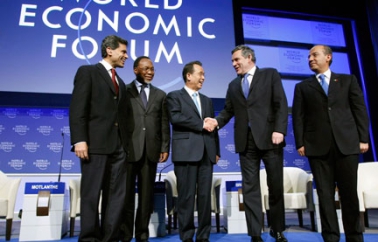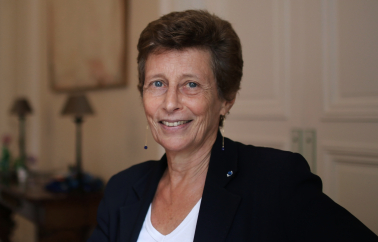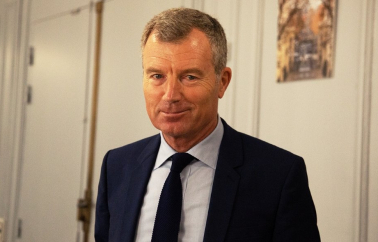
Davos wrap-up: Instability becomes the 'new normal' (Source Euractiv.fr)
Davos wrap-up: Instability becomes the 'new normal'
The 2016 World Economic Forum, which concluded on Saturday (23 January), looked at a 21st century economy led by robots and artificial intelligence, against the backdrop of a more unstable and unequal world.
Recent editions of the Forum have seen repentent bankers, business leaders and politicians seeking to make amends following the 2008 financial meltdown, which plunged the world into a series of unprecedented crises.
Risks to the global economy remain formidable. While politicians warned the European Union against its unraveling, the world’s top brass kept its fingers crossed for a "soft landing" of the Chinese economy, after three decades of growth at breakneck speed.
And doomsayers said the collapse of oil prices could herald a much more brutal slowdown of global output that could severely hit Europe's only remaining economic powerhouse, Germany.
In the face of mounting challenges, techno-optimists pitched the digital revolution to the global elite, with a new generation of robots powered by artificial intelligence offering the promise of a fourth industrial revolution and renewed prosperity.
But the digital revolution also brings challenges of its own. Even techno-optimists, such as MIT professors Erik Brynjolfsson and Andrew McAffee, warned in a recent article that digitisation could lead to "a greater concentration of wealth and power", bringing more instability to the economy.
In the long term, the world will be ruled by "uncertainty and volatility in the economy and politics—this will not change", said Jim Moffat, Managing Director and Global Consulting Business Leader at Deloitte. "Organisations are now starting to deal with it," he said.
Political leaders, business figures and luminaries interviewed by EurActiv at the World Economic Forum all painted a similar picture: the world can no longer be seen in term of optimism or pessimism. Rather, the new "new normal" of instability may well bring a bright future for some, but it will also leave more losers behind.
The loss of control in global affairs is fuelled, in part, by the erosion of the basic structures of power. The refugee crisis, turbulence in the energy sector, and even the troubled Spanish political system are all symptoms of this trend, said Moises Naim, from the Carnegie Endowment for International Peace.
"Wherever you look at in Davos, you will have a manifestation of this trend," the former Executive Director of the World Bank added.
Naim commented that the power vacuum was the main topic during a dinner he attended with leading CEOs in the forum. "They were very worried about potential threats coming from unexpected fronts," he said.
At the start of 2016, headaches have come mainly from China. The world's main growth engine is stuttering as it faces a difficult transformation from an export-led economy to a consumer-based one. Meanwhile, the rest of the world appears to distrust Beijing's growth figures.
Nouriel Roubini, Professor of Economics at New York University—also known as ‘Dr. Doom’— was among the few optimists who believe China will experience a "soft landing", with a more moderate growth rate.
Pessimism about Europe
Nevertheless, as recognised by several participants, China did not dominate the conversations, as initially expected. Moreover, Nobel laureate economist Joseph Stiglitz said that the global elite "should be more pessimistic about Europe and less about China".
Stiglitz called for a change of the eurozone's governance framework that would bring an end to the austerity embedded within it, while noting with concern the absence of a proper response to the refugee crisis.
Carl Bildt, the former premier of Sweden, listed some of the challenges looming on the European horizon: the in-or-out referendum in the UK (which he sees at "50-50"), the refugee crisis (which could lead to the disintegration of Schengen, with "profound" economic consequences for Europe) and—finally— "the digital transition”, which European leaders are “underestimating" given the economic and regulatory fragmentation affecting the EU.
But above all, political fragmentation is the main threat facing Europe, emphasised Christopher Pissarides, the 2010 Nobel Prize Winner in economics.
"European institutions are not acting as such, but as aggregators of national interests. This is not the EU and the common project we expected to see in the 1990s, when the process accelerated," lamented the Cypriot economist.
Europe's fragmented digital single market is also seen as as drag for the old continent to join the ‘avant-garde’ of the fourth industrial revolution, explained Carlos Moedas, European Commissioner for Research, Science and Innovation.
"Europe is really the center of knowledge, we have everything to make it, but the division into national silos is holding us back," Moedas warned.
'Mass intermittent employment'
The technological paradigm shift is a train that Europe cannot afford to miss, given its ageing population and its energy dependency, experts and entrepreneurs warned. Only governments which enact policies to stimulate entrepreneurship and equip their citizens with valuable skills will thrive in an era where intermittence will increasingly prevail in the labour market.
"The greatest challenge will be dealing with mass intermittent employment" and a receding welfare state, warned Nicolas Colin, a French investor, and Sciences Po researcher Bruno Palier, at the 2015 World Economic Forum.
After almost a decade spent healing the wounds of the Great Recession, this year's Davos meeting tried looking at the century ahead with optimism. But hope alone may not suffice in the era of permanent instability.
BACKGROUND
The digitalisation of industry – or Industry 4.0, as the German government calls it – is being touted as a revolution that will fundamentally alter the way companies produce and consume. Politicians in Europe regard it as a game-changer with a potential to re-industrialise the continent and wrest back production and manufacturing they have lost to regions such as Asia.
Around half of EU member states are currently implementing initiatives related to Industry 4.0. On top of these national efforts, last April, Commissioner Günther Oettinger defended an EU-wide strategy. He argued that it could ensure "scale", mobilise actors with value chains spreading across Europe and support interoperability and standardization.
Besides automation, the European Commission has pinpointed access to technology for SMEs and non-digital industries, data ownership, security, standards and skills as important issues.



